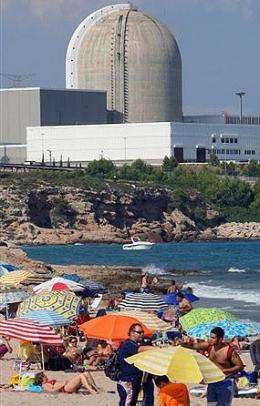People mill on a beach near the Vandellos 2 nuclear power station in Hospitalet del Infant close to Tarragona, northeastern Spain in 2008. The Spanish government will have to take a clear stand for or against nuclear power in the coming weeks when it decides whether to renew the operating licence of the oldest of the country's six nuclear plants.
The Spanish government will have to take a clear stand for or against nuclear power in the coming weeks when it decides whether to renew the operating licence of the oldest of the country's six nuclear plants.
Prime Minister Jose Luis Rodriguez Zapatero, whose socialist government has backed the development renewable energy sources such as solar and wind power, has said he wants to phase out nuclear energy in the country when the life span of its six nuclear plants expires.
But on Monday the five-member board of the country's nuclear watchdog unanimously agreed to recommend that the Garona nuclear plant in northern Spain should get a new 10-year operating licence if it upgrades its safety equipment.
Nuclear Safety Council chairwoman Carmen Martinez Ten said the decision was taken on technical and security grounds and not for reasons of "energy policy, economics or another nature".
The government now has until July 5, when the 38-year-old nuclear plant's licence expires, to decide whether to follow the watchdog's recommendation, which is nonbinding.
Spain generates around 20 percent of its electricity from nuclear power while in neighbouring France the figure is around 80 percent.
Permits for running most of the other nuclear plants will expire by 2011, or within the mandate of Zapatero's government.
A decision to prolong the life of the Garona plant on the Ebro river would be a major u-turn for Zapatero, who pledged to gradually phase out nuclear power during general elections in 2004 and 2008.
The industry ministry which is charged to make the decision says "all options" are on the table and Zapatero told parliament Wednesday that the government was studying the watchdog's report before taking a stand.
"The decision regarding Garona will be coherent with the commitments in our election programme as long as the supply of power is guaranteed," the prime minister said.
His statement was seen by some observers as a sign that the government was leaning towards renewing Garona's licence only until its original 40-year life span expires in 2011.
The Socialist Party is split on the issue, with several heavyweights such as former prime minister Felipe Gonzalez and European Union foreign policy chief Javier Solana in favour of nuclear power.
But last month the party's think tank, the Ideas Foundation, called for all of the country's nuclear plants to be closed by 2050, when it said all energy sources should be renewable.
Spain, along with Denmark and Germany, is among the three biggest producers of wind power in the European Union and the country is one of the largest world producers of solar power.
A decision to prolong the life of the Garona nuclear power plant would also be unpopular with green-minded voters who traditionally vote for the left.
The Spanish branch of Greenpeace has urged the government not to renew the licence of the plant, arguing it is unsafe. It has called it the "plant of 1,000 fissures".
The Garona plant is run by Nuclenor, which is jointly owned by Spain's two biggest utilities, Iberdrola and Endesa.
The two utilities estimate it will cost 50 million euros (70 million dollars) to carry out the upgrades to the plants safety equipment recommended by Spain's nuclear watchdog.
Support for nuclear energy waned in Europe after the 1986 Chernobyl nuclear power plant accident in Ukraine raised safety concerns over the energy source.
But in the wake of oil-price volatility and growing concerns over the environmental impact of carbon emissions has led many nations like Britain and Germany to ease their anti-nuclear stance in recent years.
(c) 2009 AFP


















